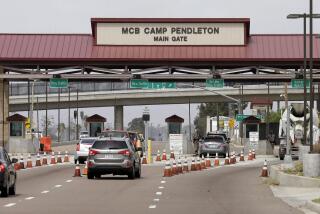Officer’s role at Haditha argued
- Share via
CAMP PENDLETON — Prosecutors and defense attorneys on Monday appealed to a hearing officer’s experience as an infantry battalion commander in their final arguments of the preliminary hearing for Lt. Col. Jeffrey Chessani, charged with failing to investigate the killings of 24 Iraqi civilians in Haditha by Marines under his command.
Lt. Col. Sean Sullivan, the lead prosecutor, told the hearing officer, Col. Christopher Conlin, that court-martialing Chessani will show that Chessani was being held to the same high standards that “99.99% of Marine officers and enlisted” obey.
“You’re an experienced battalion commander,” Sullivan said. “You were in theater. You know.”
But defense attorney Robert Muise said that, as a former commander, Conlin knows that a court-martial would hurt the morale of other commanders. He asked that Conlin recommend that the charges be dismissed and that Chessani be allowed to retire.
“The reality is, you know, sir, you served in Iraq, that civilian deaths are a regrettable consequence of this war,” Muise said.
Conlin will make his recommendation to Lt. Gen. James N. Mattis, commander of Marine Forces Central Command. If there is a court-martial, Mattis will pick the jury pool and, if there is a conviction, will decide whether the conviction stands.
In the military legal system, many of the major decisions are left to non-lawyers.
Mattis emphasized this by picking Conlin instead of an attorney as the hearing officer for Chessani, who stands accused of dereliction of duty and violating a direct order for not launching a formal investigation of the Nov. 19, 2005, killings. Chessani at the time commanded the 3rd Battalion, 1st Regiment. He is the highest-ranking member of the armed services to be charged with misdeeds in the Iraq war.
Of seven officers selected by Mattis to hear cases for the Haditha defendants, Conlin is the only non-attorney.
Several times in recent weeks, Conlin asked pointed questions that seemed to reflect a disapproval of Chessani’s actions. But he also did things that suggested he was concerned about the effect of the Haditha case on the morale of other Marine infantry troops, both enlisted and officers.
He spoke warmly to witnesses about their careers, praising some, assuring others that they have bright careers ahead. He apologized to one for getting him involved in “legal mumbo-jumbo.” When a colonel testified by phone from Saudi Arabia, the hearing officer greeted him with, “Hey buddy, Chris Conlin here, how are you doing?”
Conlin also refused to let a Benedictine monk testify about Islam for fear it would cause an adverse reaction when Iraqis learned of it.
There is nothing improper in this, legal experts say. The military justice system is “command-centric” and has been since George Washington led the Continental Army.
“Commanders have broad powers,” said Eugene R. Fidell, a military law expert in Washington. “They can very well be concerned with larger societal issues in deciding prosecutions, such as good order and discipline among the troops, along with the administration of justice.”
There were indications during the 2-week-long Article 32 inquiry, similar to a preliminary hearing, that the Haditha case has led to discontent in the infantry. Several officers, including a general, served as character witnesses for Chessani; others, subpoenaed by the prosecution, seemed resentful. Some sought and received immunity before testifying.
Capt. Jeffrey Dinsmore, who was the battalion intelligence officer, testified that he believed the decision to prosecute Chessani was politically motivated.
Lt. Col. Eric Smith, called as an expert witness on the duties of battalion commanders, said he found no joy in having to testify. He added that he did not believe “for a nanosecond” that Chessani had reason to believe a war crime had been committed by his troops.
Maj. Samuel Carrasco and Sgt. Maj. Edward Sax, who were with Chessani’s battalion in Haditha, testified that they deeply regretted having recommended that Chessani not visit the three houses where his Marines had killed 19 of the civilians.
Conlin sought to comfort Carrasco by telling him that he had done nothing wrong, implying that the fault lay with Chessani for having followed the major’s recommendation. “There’s no substitute for physical leadership,” Conlin said.
1st Lt. Adam Mathes testified that he believed the lesson of Haditha was that troops looking for insurgents have two choices: Let insurgents hiding behind civilians get away, or fight back and risk “being part of an investigation for the next year and a half.”
More to Read
Sign up for Essential California
The most important California stories and recommendations in your inbox every morning.
You may occasionally receive promotional content from the Los Angeles Times.











